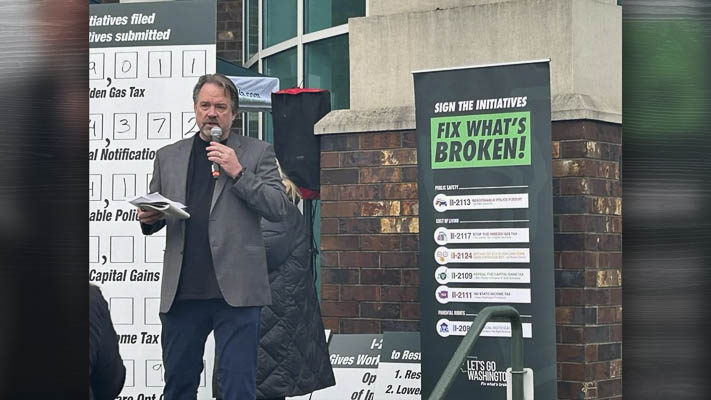
After enacting three initiatives to the Legislature, majority Democrats in Olympia passed on three other initiatives qualified by the Secretary of State
Carleen Johnson
The Center Square Washington
With years of progressive programs and billions of dollars on the line, supporters and opponents of three Washington ballot measures prepare to bring their campaigns before voters.
After enacting three initiatives to the Legislature, majority Democrats in Olympia passed on three other initiatives qualified by the Secretary of State. Those measures will be on the November ballot in less than six months.
All three are backed by Let’s Go Washington and hedge-fund manager Brian Heywood, who tells The Center Square the organization has done some recent internal polling on the three measures.
“Not giving any numbers but I’ll say I’m very comfortable and not sweating or anything,” Heywood said. “For the first two, the climate commitment act repeal (Initiative 2117) and capital gains repeal (Initiative 2109) people seem to have a pretty strong opinion about those one way or the other, but with long-term care (Initiative 2124) there’s a lot of people paying it who don’t even realize it’s being taken out of their paycheck.”
Heywood said those people unaware about the pay cut typically have a strong reaction upon learning about it.
“As soon as people find out about it, they’re like hell no,” he said.
On the capital gains tax, Heywood is certain it was designed as an attempt to “do an income tax through the back door.”
The tax passed in 2021 amounts to a 7% tax on capital gains above $250,000 in a year for individual taxpayers, or $500,000 for a married couple.
Heywood said the tax creates a disincentive for business owners.
“That family next door that’s been canceling vacations and working their butts off for so many years, and right when it’s starting to be meaningful with their business, the state comes in and says we’re gonna punish you for being successful,” he said.
Sandeep Kaushik with Defend Washington, a group organized to oppose the initiatives, tells The Center Square, “We’re going to spend every day over the next six months or so in a conversation with voters across Washington state, talking to them about why we think these partisan measures would take our state in the wrong direction and I think we’re optimistic voters will agree with us.”
Joining Defend Washington in fighting the capital gains tax repeal is Invest in Washington Now, which warns that repealing the tax will eliminate programs that help the most vulnerable.
“Initiative 2109 on this fall’s ballot will repeal the capital gains tax, giving the super-rich a tax cut at the expense of the rest of us,” the group said in a news release Thursday. “If I-2109 passes, it won’t just impact young children and parents – it will have devastating impacts on small businesses and communities too.”
The group argues Washington businesses lose $2 billion annually when working parents can’t find affordable childcare.
Heywood called that argument disingenuous because money from the capital gains tax is new, with first year collections in 2023.
“Even though they never had that money before, they want to say you can’t be such a terrible person to take money away from children and puppies, and that’s their strategy,” he said. “We’ve had a cumulative surplus in the state budget of $19 billion in the last 5 years. Then, they cry and say we don’t have enough money. This is a spending problem. It’s a big lie.”
On the CCA repeal, Heywood said environmental groups see a potential loss of funding.
“It doesn’t do anything to take carbon out of the atmosphere at all, it’s a spending boondoggle for all the green groups,” he said.
Supporters of the CCA have amassed a warchest from wealthy donors to battle the measure leading up to November.
Environmental and progressive organizations make up most of the No On 2117 coalition that has amassed $5 million, with $3 million of that coming from billionaires Bill Gates and Chris Stolte as well as Craig McKibben and his wife Sarah Merner, according to the Public Disclosure Commission.
This report was first published by The Center Square Washington.
Also read:
- House Democrats advance $18B in tax hike proposals as session winds downHouse Democrats in Washington advanced several tax hike proposals as the legislative session nears its end, aiming to address a major budget shortfall.
- Republican budget leaders see showdown ahead as Senate Democrats approve trio of major tax increasesSenate Democrats in Washington have approved major tax increases, prompting Republican budget leaders to warn of a growing showdown ahead.
- Representatives from the 18th and 20th Legislative Districts to hold joint town hall on May 3Lawmakers from the 18th and 20th Legislative Districts will host a joint town hall on May 3 at Battle Ground City Hall to review the legislative session and hear from residents.
- Expect delays on northbound I-5 near Ridgefield through May 9Northbound I-5 travelers near Ridgefield should expect delays through May 9 as crews work on improvements at the Exit 14 off-ramp to support future development.
- Brandon Erickson announces candidacy for Clark County Charter Review CommissionBrandon Erickson has announced his candidacy for the Clark County Charter Review Commission, seeking Position 1 in District 2.
- Clark County Sheriff’s Office investigating a reported burglary that led to apparent suicideThe Clark County Sheriff’s Office is investigating a reported burglary in Vancouver that ended with the apparent suicide of Charles Gardiner, interim chief of the Cowlitz Tribal Public Safety Department.
- POLL: Why did voters reject all three tax proposals in the April 22 special election?Clark County voters rejected all three tax measures on the April 22 special election ballot, prompting questions about trust, affordability, and communication.











